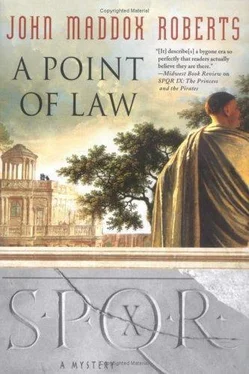John Roberts - A Point of Law
Здесь есть возможность читать онлайн «John Roberts - A Point of Law» весь текст электронной книги совершенно бесплатно (целиком полную версию без сокращений). В некоторых случаях можно слушать аудио, скачать через торрент в формате fb2 и присутствует краткое содержание. Год выпуска: 0101, ISBN: 0101, Издательство: St. Martin, Жанр: Исторический детектив, на английском языке. Описание произведения, (предисловие) а так же отзывы посетителей доступны на портале библиотеки ЛибКат.
- Название:A Point of Law
- Автор:
- Издательство:St. Martin
- Жанр:
- Год:0101
- ISBN:9780312337254
- Рейтинг книги:5 / 5. Голосов: 1
-
Избранное:Добавить в избранное
- Отзывы:
-
Ваша оценка:
- 100
- 1
- 2
- 3
- 4
- 5
A Point of Law: краткое содержание, описание и аннотация
Предлагаем к чтению аннотацию, описание, краткое содержание или предисловие (зависит от того, что написал сам автор книги «A Point of Law»). Если вы не нашли необходимую информацию о книге — напишите в комментариях, мы постараемся отыскать её.
A Point of Law — читать онлайн бесплатно полную книгу (весь текст) целиком
Ниже представлен текст книги, разбитый по страницам. Система сохранения места последней прочитанной страницы, позволяет с удобством читать онлайн бесплатно книгу «A Point of Law», без необходимости каждый раз заново искать на чём Вы остановились. Поставьте закладку, и сможете в любой момент перейти на страницу, на которой закончили чтение.
Интервал:
Закладка:
“Yes, so?”
“Earlier this morning I talked with Cato. He says that, a few months ago, the younger Caius Octavius gave the funeral eulogy for his grandmother, Julia, the sister of Caesar. Is Octavia saying that she didn’t attend her own grandmother’s funeral?”
“Decius! Sometimes you really are inspired! I attended that funeral. She was my aunt, after all, and I was there with all the Julia Caesares. I heard the boy speak, and it was excellently done for one so young. It was while you were still on Cyprus.”
“And was Octavia there?”
“She was. So why is she lying about it now? Why does she want to pretend she has nothing to do with her brother?”
“I intend to find out.”
9
The night had been a long one, but I woke early and fully alert for a change. Time was getting short, and I had none of it to waste. I rousted Hermes, and Julia and the slaves got me presentable and out the door before full daylight broke over the City.
“To the Archive again, Hermes,” I said.
“Again?”
“Yes. Today, it’s the Land Registry.”
This was located on the ground floor with several of its rooms dug back into the side of the Capitoline Hill. Since nothing was more important than ownership of landed property, these documents got the most stringent protection from fire.
In charge of this department was an old freedman from Athens named Polyneices. We found him at his desk in the gloomy interior of the huge building. He was white as a grub from spending his days entombed within the sacred soil beneath the Capitol. The only illumination came from oil lamps that burned in locked lanterns with lenses of inch-thick glass. The lamps had to be lighted outside, then locked before being carried within. To kindle a light within these rooms meant crucifixion for a slave, beheading for a free man.
“This is most irregular,” Polyneices said, not quite as peevishly as Androcles, whose offices were two floors above.
“What constitutes regularity in this place?” I asked him. “I just need to find the title history of a piece of City real estate. It’s a tedious job, I’ll grant you that, but I’ll make it worth your while. Don’t bother trying to tell me you’re unbribable. You are a Greek, after all.”
“Do I look like I need money?” he asked. “I’ve already paid for my funeral, and I’ve bought a very decent tomb for my family out on the Via Tiburtina.”
“Everybody needs money!” Hermes protested.
“Not necessarily,” I said. “However, I shall be praetor next year, and very few men never need a favor, if not for themselves, then for some family member. How about it, Polyneices? I am sure you are all very respectable people, but surely you have the odd scapegrace, the inevitable ne’er-do-well, among your kin? My own father has bailed me out of the lockup more than once in my young and foolish days.”
He thought, stroking his jaw in that odd Greek fashion. “Well, I do have a grandson who causes me to lose sleep. He’s caused his mother endless worry, and he’s getting old enough to get into serious trouble.”
“If he’s arrested in the coming year, have his mother call on me and remind me that he’s your grandson. I’ll let him off for a first offense, as long as it doesn’t involve bloodshed or robbing a temple.”
“Oh, he wouldn’t do anything that serious, Senator. Just youthful foolishness. Let me see what I can do for you.” He disappeared into the gloom of the underground chambers like one of Pluto’s minions.
“Will you really let him off?” Hermes wanted to know.
“Surely. If it is just youthful foolishness, the scare will do him a great deal of good. If he’s a born offender, he’ll be back and I won’t spare him a second time.”
A short while later, Polyneices emerged with a deed engraved on plates of copper. Some old Roman families used these copper plates as further insurance against fire, water, hungry insects, and simple age. Lead plates were sometimes used for this purpose, but lead melts at a low temperature, making it a false economy. Copper is more expensive, but it lasts forever. I carried the plates to the doorway, where enough light made its way in for me to read them.
The deeds were for the house lived in by the late Fulvius and owned by Caius Claudius Marcellus. But Marcellus had owned it only for the last four years. Before that, the owner was Caius Octavius.
“How was this property transferred from Octavius to Marcellus?” I asked Polyneices. “Was it purchased? A gift?”
“I have no idea, Senator. The law requires a record of transfer of ownership, but it does not require disclosure of the manner of transfer. Caius Octavius states that this property now belongs to Marcellus and he appends his seal. That is it. I would not want to be the one to ask such a man to furnish particulars.”
“True,” I said. “Aristocrats are touchy when vulgar subjects like money are brought up. They love to acquire it, but they hate to talk about it. I don’t suppose you might have records of holdings in Baiae here?”
“Are you joking, Senator? Deeds pertaining to the City and surrounding countryside give us enough trouble. We need a new tabularium as it is. No, I’m afraid you’ll have to go to Baiae if you want to see those deeds.” A malicious gleam came into his eye. “You plan to be consul in a few years don’t you, Senator? You could make your name immortal by giving us a new archive. You could call it the Tabularia Caecilia Metella . The land just above this building is wide open. Caesar is going to give us a huge new basilica, you know. It will be called the Basilica Julia, and it will be the largest building in Rome. But your tabularium will be on higher ground and will look more impressive.”
“If I get a chance to loot Parthia in my propraetorian year, I’ll consider it. But if I give the City an archive, I’ll have it organized like the Museum in Alexandria. It will put memorizers like you out of work.”
“What do I care? I’ll be retired by then.”
Outside, Hermes and I watched the Forum warm up in the morning sunlight.
“I suppose we could try the censor’s records again,” Hermes said. “Caius Octavius might have declared ownership of that estate in Baiae, if it was his.”
“It might be a lot of work for nothing,” I told him. “He needn’t have declared every last thing he owned, just enough to prove his status and fitness for office. His City property alone should have been plenty for that. In any case, what we need to know now isn’t who owned which property when. It’s what the connection might be.”
Hermes leaned with his elbow on the railing in front of the Tabulanum , his chin cupped in one palm, looking like one of the Greek gods pondering the fate of mortals. He had grown into a truly handsome young man.
“It seems to me,” he began, “that the last few years everyone is for either Caesar or Pompey. Marcellus hates Caesar. But Octavius? Like you, he married Caesar’s niece. Then he gave his daughter in marriage to Marcellus.”
“Octavia,” I said, “claims that she has cut her ties to the Julians, but she is lying. Why?”
“Let’s consider it,” he said, “but let’s not think on empty stomachs.”
“Excellent idea.”
We went down to one of the little side streets off the Vicus Iugarius where one of our favorite food stalls was located. At the counter we got steaming bowls of fish stew laced with garum and cups of heated sour wine, heavily watered and lightly spiced. It was eye-opening food, guaranteed to leave you wide awake and ready to face the most tedious Senate meeting. Hermes and I took our breakfast outside and dished up the sour, vinegary stew with pieces of flat bread.
Читать дальшеИнтервал:
Закладка:
Похожие книги на «A Point of Law»
Представляем Вашему вниманию похожие книги на «A Point of Law» списком для выбора. Мы отобрали схожую по названию и смыслу литературу в надежде предоставить читателям больше вариантов отыскать новые, интересные, ещё непрочитанные произведения.
Обсуждение, отзывы о книге «A Point of Law» и просто собственные мнения читателей. Оставьте ваши комментарии, напишите, что Вы думаете о произведении, его смысле или главных героях. Укажите что конкретно понравилось, а что нет, и почему Вы так считаете.









